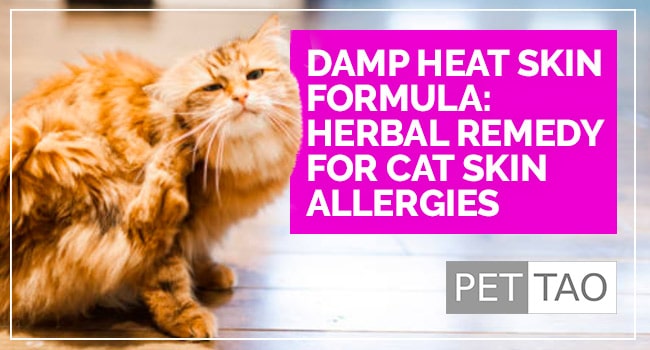Cats with skin allergies are always licking and scratching.
Skin allergies cause cats to lick the tail base, groin area, and their flanks.
Sometimes, a cat’s hair falls out from the constant licking.
Cats with skin allergies also continuously scratch their ears, neck, and head.
Sometimes, if a cat’s allergies are really bad, small pustules spring up around the neck and head – sometimes even all over the body.
Infections that pop up due to allergies are termed “secondary infections” and are usually caused by bacteria or fungi.
Fungal yeast colonizes the ears and bacteria grow opportunistically all over the body. Secondary infections are best treated by a veterinarian.
Cat Skin Allergy Symptoms
I see these all the time:
- Licking around the tail base, groin, and flank
- Bald spots from excessive licking
- Sores and scabs
- Small, puss-filled bumps
- Hot spots
- Greasy or sticky looking coat
- Chronic ear infections
Cat skin allergies are often caused by exposure to many different allergens.
Cat skin allergy symptoms and causes are very similar to the symptoms and causes of human skin allergies.
Trees, bushes, grasses, and weeds often cause cat skin allergies while your cat is outdoors.
Indoor allergens include dust mites, chemicals, mold spores, drugs, and dander from other pets.
Yes, your cat can even be allergic to your dog!
As mentioned earlier, food allergies can also cause your cat to have skin allergy reactions.
Basically, the main causes of cat skin allergies include:
- Allergies to fleas or external parasites
- Seasonal allergies
- Food allergies
How Do I Treat My Cat With Skin Allergies?
How to relieve cat skin allergies at home:
- Use monthly flea prevention
- Rid your home of common allergens like mold, dust mites and cigarette smoke
- Wash your cat’s bedding every week
- Spray itchy areas with a solution of 1⁄2 water and 1⁄2 vinegar. Vinegar is antiviral, antibiotic, and antifungal, and will restore the skin’s pH balance.
- Try switching your cat’s food
How to relieve cat skin allergies with the help of your veterinarian:
- Reduce itching with oral and topical pharmaceuticals – Genesis spray
- Pharmaceutical allergy medicine – Prednisone, Atopica
- Allergy testing – Immunotherapy
A little investigation and work on your part, mixed with the professional help of your veterinarian, can help your cat feel much better!
More Powerful Tools for Overcoming Cat Allergy Challenges
There are many quick and easy changes you can make at home to help your give your cat an edge on easing allergy challenges.
- Learn more about cat allergies.
- Switch to a Limited Ingredient Cat Food Recipe. PET | TAO Limited Ingredient Cat Food Recipe is naturally low in foods that stimulate an allergic response.
- Supplement with medicinal mushrooms. PET | TAO Complement Immune Mushroom Blend eases inflammatory response and ease allergy symptoms.
- Try digestive enzymes and probiotics. PET | TAO Harmonize Gi boosts gut health and combats food allergens.
- Feed Freeze Dried Lung Treats. According to TCVM, Lung is on the same meridian as the skin. Therefore, lung treats help both breathing and skin allergies. Lung treats support lung and skin similar to a glandular supplement in a “like treats like” fashion.
- Learn more about TCVM Herbal Remedies. Chinese medicine offers many amazing natural solutions for dog allergies Some good examples are:








